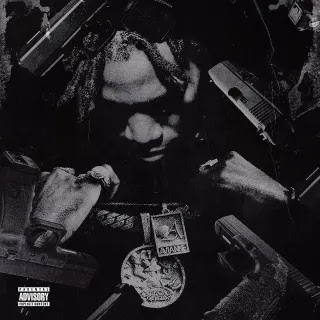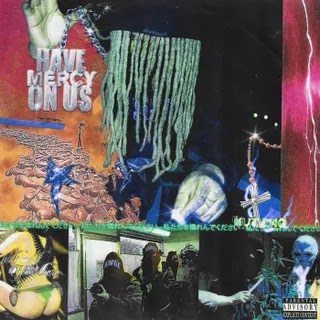On his second album of 2020, the underground New York rapper reaches a new level. The vibe is calm and bittersweet, as Navy Blue sinks deep into the recesses of his mind.
Over the course of the last half-decade, the 23-year-old skateboarder, graphic designer, and streetwear model born Sage Elsesser has quietly crafted his own version of the brisk and insular rap currently powering the New York underground. Much of Navy Blue’s recent music—particularly his debut album, 2020’s Àdá Irin—charts paths through familial trauma and grief; his songs scan as holistic diary entries, the literary equivalent of burning sage to cleanse your surroundings. Song of Sage: Post Panic!, Navy’s second full-length album of 2020 released this past December, sinks deeper into the recesses of his mind, fighting greater battles while reaping bigger rewards.
Listening to Song of Sage, the pains and pleasures of Navy’s past feel three-dimensional. Mental cobwebs gather in corners; memories loom like kaiju towering over cities; family and loved ones glow like beacons. The writing is lived-in, spacious and intimate in equal measure: “So many photos on the wall at most the times I was caught/In a web that I had spun myself, the damage did a lot,” he remembers on “1491.”
Yet, across Song of Sage, the past and present blur. Navy often takes an active stance, placing his healing in the center of the frame: “Look myself in the mirror, start tearing up as I reflect/I rearrange my meaning/December days, I recollect, I reconnect through dreaming,” he offers on “Dreams of a Distant Journey.” Even on the celebratory closer “224,” after the blessings and gratitude have taken effect, Navy still acknowledges the need to mend his damaged soul in the present tense.
Lyrically, Navy dances between the specific and the opaque. His writing is descriptive without giving too much of his inner monologue away (“I write for those who know me,” he says on “Deep Water Blue”). On “Aunt Gerry’s Fried Chicken,” he briefly reflects on hearing his mother's screams after his brother has been shot before abandoning the thought. His voice audibly cracks and strains when he mentions crying in front of his partner while “blazing like a comet” on the standout “Self Harm.” Navy wades through oceans of sadness, yet never dwells for long. Hope and gratitude are his rudders, manifesting in his family and his spirituality. “It’s soothing to know the body is just a shell,” he exhales on “Tired,” content to live and learn.
These songs don’t only wring deeper emotional truths than before; they also enhance his craft. He’s experimenting with flows, too, matching billy woods’ zig-zagging bar structure on “Poderoso” and pulling off a double-time delivery on the hook for “Deep Water Blue.” His growth is apparent, expending less energy to hit more potent highs like the soccer players he consistently name-checks.
The bittersweet energy expressed through Navy’s lyrics also seeps into Song of Sage’s production. California rapper/producer Evidence pitches a wailing siren against vocal chants and steady drums on “1491,” creating an anxious sense of speed. New Jersey producer Roper Williams infuses “Dreams of a Distant Journey” and “Self Harm” with soul and sorrow. Rising Montreal producer Nicholas Craven’s four placements—particularly the shimmering “Back to Basics” and the smooth shuffle of “Pressure Points”—are among the best loops you’ll hear on any rap album in the coming year.
Every beat here is a winner, but the standout is Navy’s crunchy guitar loop on the title track “Post Panic!,” a place where words and music become amorphous. Though Navy is responsible for only five of the project’s 18 beats, they gel seamlessly, much like the beats he produced for As Above So Below, the collaborative album he produced in full for DC rapper ANKHLEJOHN. Song of Sage’s beats breathe and crumble with organic beauty, loops falling off the bone like tender meat.
In the face of mental anguish, Navy Blue has created the best music of his career. Song of Sage: Post Panic! is a raw and assured highlight of the continuously morphing New York underground, recontextualizing an old sound for a younger generation. It narrows the degrees of separation between two generations of NY talent—Navy shouts out Ka on “Breathe,” featuring a showstopping verse from fellow Brooklyn veteran Yasiin Bey—while crowning a new disciple in the process. Above all, though, Navy is committed to the clarity of metamorphosis, recreating himself a little stronger and a little more humble every time.
















0 comments:
Post a Comment